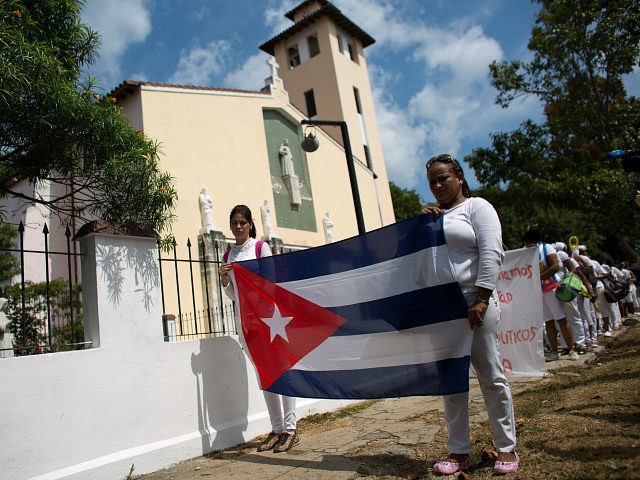Cuban state police violently arrested nearly seventy dissidents, most members of the Ladies in White movement, on their way to attend Catholic Mass on Sunday in what has become a weekly ritual for the oppressive communist state.
According to Lady in White Aliuska Gómez, only nine of the dozens of women across the country trying to practice their religion managed to reach their local churches. In Havana, Gómez told reporters (English translation by Babalú Blog here), over seventeen members of the group were violently arrested. Twelve women were swept off the streets in neighboring Matanzas province and nine others in eastern Santiago de Cuba. Gómez estimated that another thirty anti-communist dissidents were arrested attempting to join in the Ladies in White weekly silent march to church.
“We do not have reports from other provinces, so the general count could increase,” Gómez said on Monday.
The Ladies in White are a dissident group formed in 2003 by the wives, mothers, daughters, and other relatives of Cuba’s political prisoners. Their sole form of protest is to march in silence wearing white and holding gladiolas and the images of their imprisoned loved ones and attend Mass every Sunday. For the past 109 Sundays, the Cuban government has refused to allow them to enter the Santa Rita church in Havana that they had made their spiritual home in for over a decade.
Among those imprisoned this weekend were the head of the Ladies in White group, Berta Soler, and her husband Ángel Moya (Moya was serving time in prison for attempting journalistic activity when Soler joined the group).
Following her release, Soler told Martí Noticias that her arrest and that of her husband were violent and that the government used between seven and ten uniformed male and female police officers to restrain her and drag her into a police car.
Soler was also arrested last month along with thirty others attempting to attend Mass. That time, Soler held up a sign demanding freedom for political prisoners. “They took her sign away violently and dragged her into a car,” a Lady in White who witnessed the arrest said. “Then a mob began to yell obscenities at us, calling us ‘counterrevolutionaries,’ ‘maggots,’ and shouting ‘this street belongs to Fidel.’”
The Ladies in White are far from the only dissidents arrested for publicly expressing condemnation of the brutal communist regime and its dictator Raúl Castro. Last week, dissidents recorded the violent arrest of anti-communist activist Ailer González, a member of the pro-democracy Estado de SATS group, on the streets of Havana for attempting to leave her home.
As González is known to authorities as a dissident, the government arbitrarily placed her on house arrest, according to a plainclothes secret police officer who confronted her as she attempting to walk out of her door. When asked why she could not leave her home, the agent did not give her an answer, and two uniformed police officers attempted to shove her in a car. Noticing an activist filming the arrest, the plainclothes agent walked González down the street before the three shoved her violently into a police car some steps away from the camera.
“This happens constantly against opposition women in Cuba and is something that the world and democratic institutions should shed a light on,” González told Martí Noticias following her release. The government charged her with “public disturbance” for shouting “down with Raúl” in public.
NGOs documenting such arbitrary arrests in Cuba found that the government had conducted 2,559 political arrests between January and June 2017, about 3,500 fewer than during the same time period in 2016 due to the extremely high frequency of arrests during President Barack Obama’s visit to the island that year.
Human rights activists warned, however, that the change in the number of arrests is “not due to any positive changes whatsoever in the political will of the Cuban government, but to a change in its repressive mechanisms.” House arrests like what González experienced are becoming increasingly common to avoid high tallies of politically-motivated arrested by international watchdog groups.

COMMENTS
Please let us know if you're having issues with commenting.